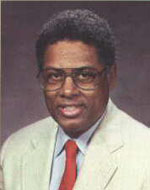Jewish World Review / May 20, 1998 / 24 Iyar, 5758
Thomas Sowell
 Smart but silent
Smart but silent
WHILE A FATHER AND A MOTHER may have different reactions to problems that arise with
their child, seldom is that difference as extreme as in the reactions of the parents of a
young child who was late in talking. The little boy was being evaluated by a public
school and the evaluator's conclusion was that he was mentally retarded.
The mother began to cry and the father began to laugh.
The father was Professor Stephen Camarata of Vanderbilt University, a speech
pathologist specializing in childhood language disorders. He realized that the evaluator
was incompetent. Professor Camarata is the author of scholarly articles and a textbook
on the subject, and runs his own clinic at the Vanderbilt medical school. Moreover, he
himself talked late.
Tragically, misdiagnoses and counterproductive treatment of children who talk late are
not uncommon. One professor of neurosciences says that at least three-quarters of the
medical histories she reads contain at least one report that is "completely off the
mark."
 Historic examples of late-talking children who were wrongly believed to be mentally
retarded include nuclear physicists Albert Einstein and Edward Teller. Another nuclear
physicist who had talked late worked with them to create the first atomic bomb --
Professor Richard Feynman of Cal Tech, a Nobel Prize winner.
Historic examples of late-talking children who were wrongly believed to be mentally
retarded include nuclear physicists Albert Einstein and Edward Teller. Another nuclear
physicist who had talked late worked with them to create the first atomic bomb --
Professor Richard Feynman of Cal Tech, a Nobel Prize winner.
Children talk late for such a wide variety of reasons that their intellectual levels range
from severely mentally retarded all the way up to people of the highest genius. Some
have physical problems that impair their hearing or make it difficult for them to form
words. But there are others who go through all sorts of medical and mental tests with
flying colors and still say nothing.
Five years ago, when my son graduated from college, I mentioned in this column that
he was almost four years old before he began to talk. Letters poured in from around
the country from parents of similar children. Like my son, these children not only talked
late but also showed unusual analytical ability in mathematics, chess, computers and
the like, as well as having remarkable memories.
Although I did not realize it at the time, this column set in motion a chain of events that
lead eventually to the publication of my book Late-Talking Children.In turn that led to
my learning about Professor Camarata and to his beginning his own study of bright
children who talk late.
His group of parents, like those that I studied, are able to share their experiences with
one another, as well as contributing information to advance research on speech delays
among bright children. Moreover, Professor Camarata can do something that I as a
layman could not do -- diagnose the children and advise their parents.
While his research is still in progress, my research on 46 late-talking children turned up
striking patterns among both those children and their families. First of all, the great
majority of these children are boys. The average age at which they talked was four.
Almost all showed unusual ability at analytical tasks like doing puzzles when they were
toddlers, as well as exhibiting remarkable memories.
Three-quarters of these children have at least one engineer, mathematician or scientist
among their close relatives -- and often more than one. Most also have more than one
close relative who plays a musical instrument. More than one-fourth have a
professional musician among their close relatives. The children themselves are often
mathematically or musically inclined, or both.
All this suggests heredity, though too many people have been all too willing to blame
the parents -- especially the mother -- for a child's speech delay. But usually the other
children raised by the same parents talk at the normal time or earlier.
There is much that remains to understood about children like this. Moreover, other
highly intelligent children, most of whom have no speech delays, have other anomalies
-- allergies, myopia, left-handedness -- more often than do members of the general
population.
While not even the experts have yet fully understood such things, what we should all
understand are the dangers of shooting from the hip when diagnosing young children.
Many of the personal characteristics found among high-IQ children would be enough to
get them labelled "autistic" by evaluators who blindly follow a checklist of symptoms.

5/18/98: Israel, Clinton and character
5/14/98: Monica Lewinsky's choices
5/11/98: Random thoughts
5/7/98: Media obstruction of justice
5/4/98: Dangerous "safety"
5/1/98:
Abolish Adolescence!
4/30/98: The naked truth
4/22/98: Playing fair and square
4/19/98: Bad teachers"
4/15/98: "Clinton in Africa
"
4/13/98: "Bundling and unbundling
"
4/9/98: "Rising or falling Starr
"
4/6/98: "Was Clinton ‘vindicated'?
"
3/26/98: "Diasters -- natural and political"
3/24/98: "A pattern of behavior"
3/22/98: Innocent explanations
3/19/98: Kathleen Willey and Anita Hill
3/17/98: Search and destroy
3/12/98: Media Circus versus Justice
3/6/98: Vindication
3/3/98: Cheap Shot Time
2/26/98: The Wrong Filter
2/24/98: Trial by Media
2/20/98: Dancing Around the Realities
2/19/98: A "Do Something" War?
2/12/98: Julian Simon, combatant in a 200-year war
2/6/98: A rush to rhetoric

 Smart but silent
Smart but silent
 Historic examples of late-talking children who were wrongly believed to be mentally
retarded include nuclear physicists Albert Einstein and Edward Teller. Another nuclear
physicist who had talked late worked with them to create the first atomic bomb --
Professor Richard Feynman of Cal Tech, a Nobel Prize winner.
Historic examples of late-talking children who were wrongly believed to be mentally
retarded include nuclear physicists Albert Einstein and Edward Teller. Another nuclear
physicist who had talked late worked with them to create the first atomic bomb --
Professor Richard Feynman of Cal Tech, a Nobel Prize winner.